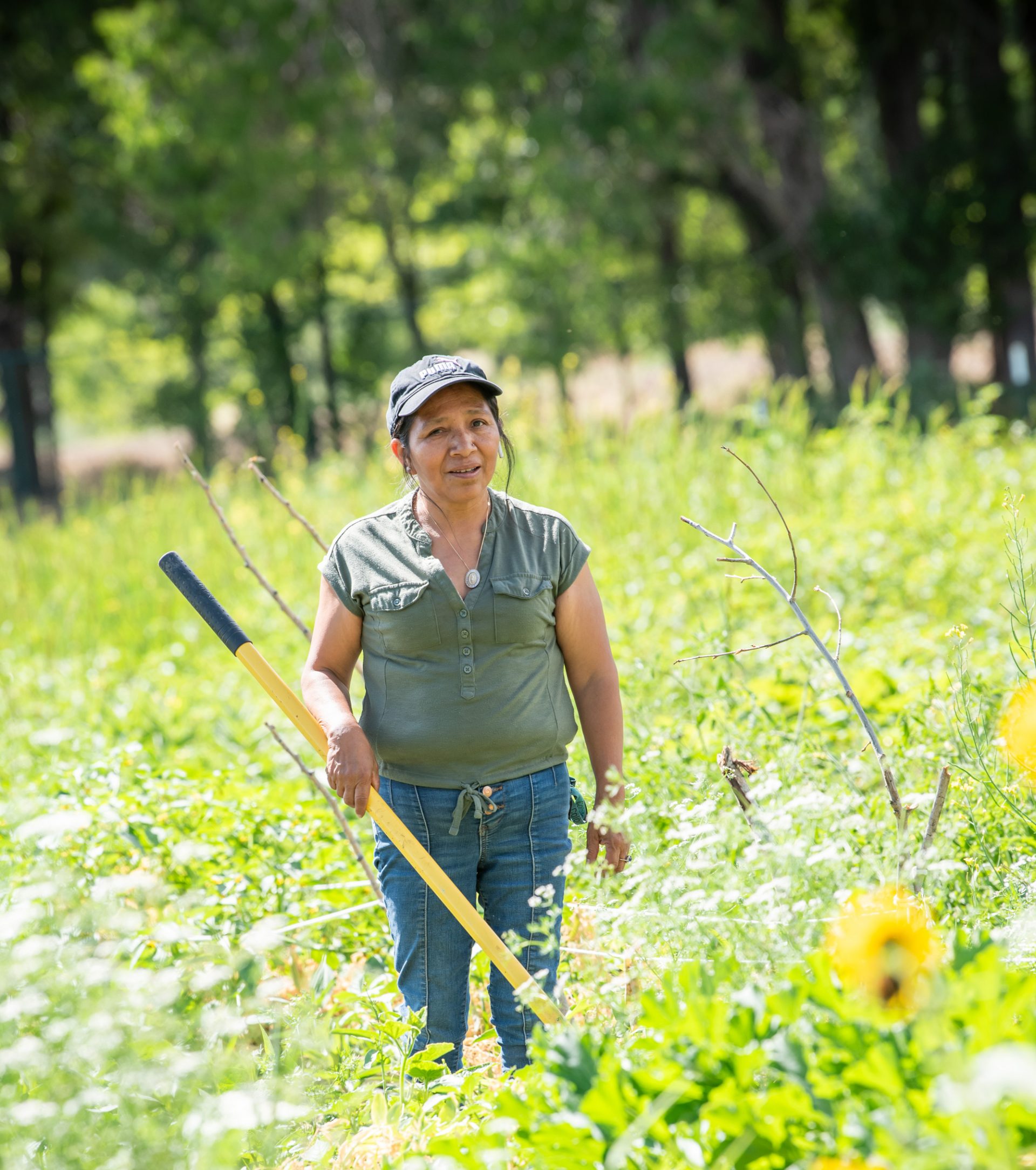By Kim Black. Photo: Matt Lit.
Nestled along the Rio Grande in Alamosa, CO, is a special opportunity to meet the farmers who grow your food, participate in the local food movement, and build community. The event is the Mercadillo en el Rio Farmer’s Market, hosted by the Rio Grande Farm Park (RGFP). The Mercadillo brings people together from a variety of backgrounds and is an inclusive venue for celebrating the rich diversity and heritage of the Valley.
Visitors to the Mercadillo can enjoy storytelling and crafts from local vendors and access to the river and a playground. Food stamp cards, such as Snap, EBT, and Double Up Food Bucks are all accepted at the Mercadillo, making it easier for all to support local agriculture and experience this unique community. This onsite farmer’s market runs each Wednesday from 4 to 7 p.m., July-September.
Hosting the Mercadillo is not the only way that this 38-acre, multi-use farm gives back to the community. Guided by a commitment to sustainable agriculture, organic farming, cultural heritage, community, collaboration, and impact, the Rio Grande Farm Park is “a stronghold for the community,” said RGFP Director, Seth Armentrout.
The Farm Park first began as Polston Elementary School Garden, serving students and their families until the elementary school was retired and torn down in 2012. Economic hardship drove a communal effort to keep the land available for sustenance farming. With the goal of preserving public access to the land, the San Luis Val
ley Local Foods Coalition (SLVLFC) and community members bought the land several years ago. Since then, SLVLFC has added a market farming program, built an education center building, and developed youth outreach and volunteer programs.
Brayan Flores, RGFP Assistant and student at Adams State College, is passionate about working with youth at the Farm Park. Since Flores attended Polston Elementary School himself, he described his relationship with the Farm Park as “a full-circle experience that holds a special place in my heart.”
Flores runs the Youthworks program at RGFP and works with his father Jesus Flores, who is also Farm Park Manager. Together, they take care of the land, support the people who grow there, and maintain the irrigation system.
“We are trying to build food sovereignty and a sense of belonging in a place, and we’ve been working on that for a long time.”
The Youthworks program is designed for kids from across the country to come for a week at a time and volunteer for three hours, twice a week. Another program, Rising Stewards, hosts local high school students who work as interns and learn how to grow food while exploring career opportunities and developing entrepreneurial skills.
The Rio Grande Farm Park also offers the Market Farming Program, designed to support disadvantaged farmers without the means to purchase viable land with water rights. Currently, the program supports 11 market farmers that grow direct-to-market.
“These programs are a way to help people get started and then move out into the world on their own,” said Armentrout. Market Farmers are also compensated by RGFP to provide a portion of their harvests to the Food Bank Network, Boys and Girls Club, and the Immigrant Resource Center through a program called Farm to Pantry.
The Farm Park’s Food Sustenance Farming Program offers free, ditch-irrigated, drip line plots to local farmers, and currently supports 26 families who grow their own food on 2.5 acres. “This is a real source of food for people who save their seeds, who know how to grow, and who come back year after year,” Armentrout explained.
“We are trying to build food sovereignty and a sense of belonging in a place, and we’ve been working on that for a long time,” said Armentrout.
He continued: “People that are farming here bring specific tools, seeds, practices from their cultures, and they find ways to work with everyone. Some want to do no-till, and some want no soil compaction.”
RGFP generates revenue for itself by charging rent for market farming, selling compost to the community, growing its own potatoes, and renting out the education center. The farm produced a whopping 7,000 to 10,000 pounds of huckleberry gold potatoes last season.
A greenhouse was also recently built for year-round food production to sell to the Valley Roots Food Hub. Collaboration with UTE Mountain Ranch allows RGFP to bring in bacterial compost to sell at cost to consumers. RGFP also relies on federal, state, and local grants, and individual and community donations.
The Farm Park engages community members in their projects whenever possible. For example, local youth, including those from the Crestone Charter School, helped to build RGFP an adobe wall using traditional building practices. In addition, an Amish contractor built RGFP’s education center, a local mountain man built the recent greenhouse, and local artist Nora McBride, in collaboration with RGFP staff, volunteers, and the Boys and Girls Club of the SLV installed a mural celebrating community.
If you would like to participate in this dynamic community, consider volunteering at RGFP on the last Saturday of every month. Volunteers help take care of the land, harvest potatoes, weed, and manage the gate system.
To learn more about RGFP, visit http://www.riograndefarmpark.org/about
Caption: Local Odilia Lorenzo Nicolas works on her parcel provided by The Farm Park’s Food Sustenance Farming Program.


